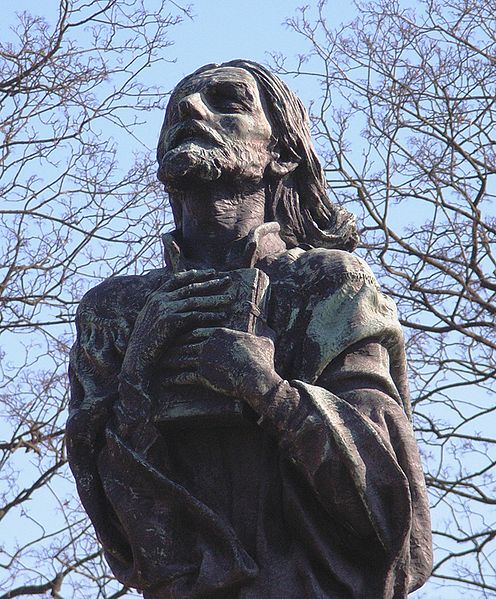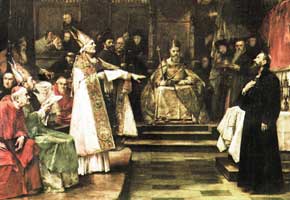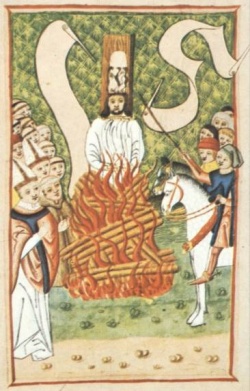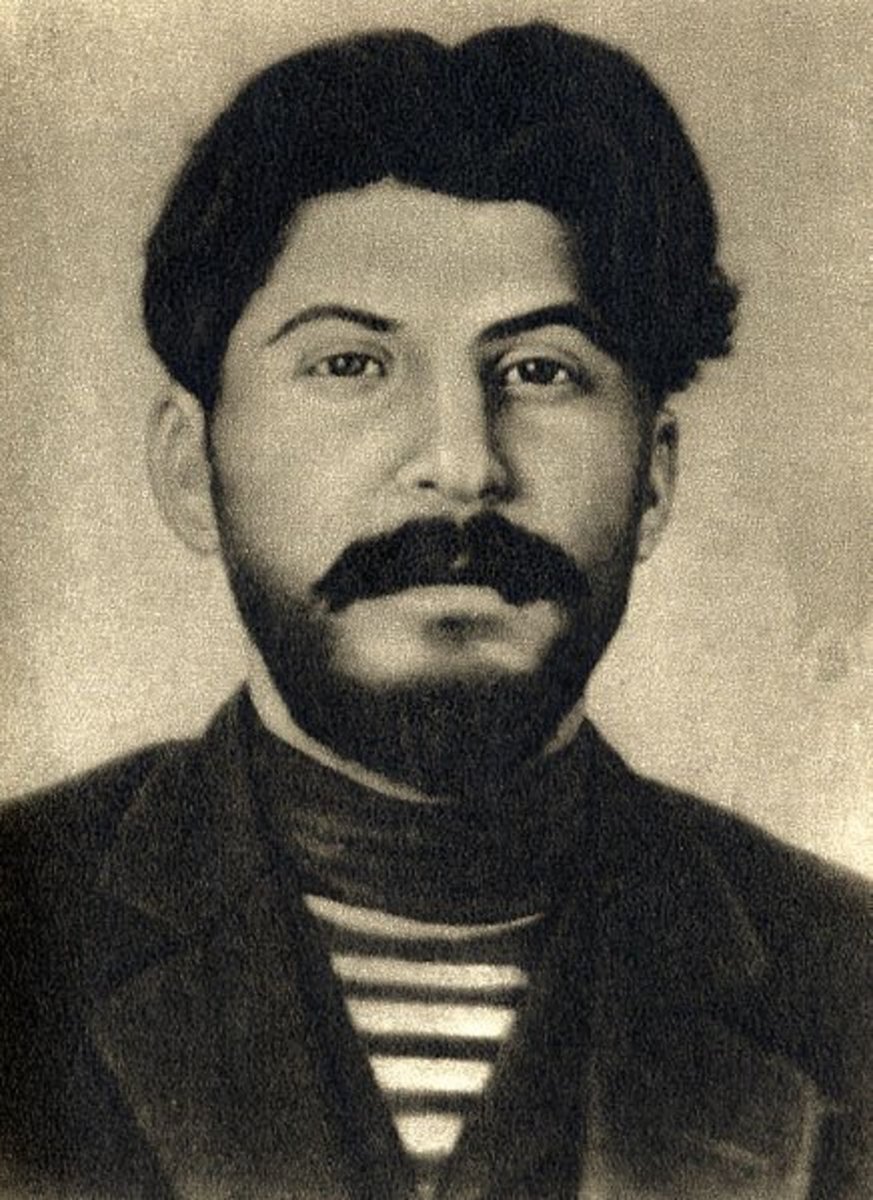Jan Hus: Religious Reformer and Martyr

Jan Hus was a man of religious reform who was a firm and loyal advocate of his beliefs who “did not bow before the authority of the church” (Říčan 1992 , 6). He preached for the freeing of the church of the economic and aesthetic embellishments of the clergy. Evidence of his steadfast conduct is analyzed here with regards to two specific points in Hus’ life. The first to be discussed is the period shortly after the beginning of the fifteenth century when he was appointed preacher of the Bethlehem Chapel by Archbishop Zbyněk Zajíc. During this time, Hus was supported by the archbishop in his preaching of clerical reform. However, Zajíc eventually turned against Hus when he was faced with pressure from the church to put an end to the challenge Hus presented to it. It attests to Hus’ dedication to his reform for him to persist against this powerful figure. The following argument leads us to the final chapter in his life where he is forced to the end of his controversial battle as he faces execution. It is the continuing virtue he expressed in this situation which offers further evidence in support of the assertion of his unfailing loyalty.
Hus was in his thirties at the time of his inception as preacher in the Bethlehem Chapel. He passionately spoke out against the moral degradation of the church under the comfortable protection of Zbyněk and even Queen Sophia, who gained admiration for him as a frequent attendant of his preaching. At this time, Hus spoke out against the church for it’s exploitation of the people, who were led to believe that providing certain services and buying indulgences from the Church would ensure their salvation in the afterlife. He also criticized the extravagant nature of the clergy with their rich clothing and lavish living arrangements. (Wagner 1983, 29-30).
This earned him the hostile attention of the Church and Zajíc came under pressure to bring Hus' preaching, which it claims is a heretical threat to their doctrine, to an end. Zajíc never gave in at first but when he felt that Hus had stepped out of his bounds, he expelled him from the chapel. He was instructed to order the burning of John Wycliffe’s books which had been of influence to Hus as well as his initial inspiration. Despite being banned from the church, Hus continued to preach in defiance. Hus’ ability to oppose such a powerful figure in his life shows just how strongly he was willing to hold to his beliefs. It was Zajíc who offered him position in the chapel from the beginning and he therefore had the power to take it away.
Jan Hus at Council of Constance

That he stood up in the face of such adversity is quite clearly spelled out in a letter he wrote to Christian of Prachatice. It is here where his faith and steadfast spirit appears to be rooted in loyalty to the moral purity of the Church and that he must “suffer persecution in the name of Christ” (Spinka 1972, 88) if the holy kingdom is to unconditionally embrace him. This divine notion for Hus must have greatly transcended his earthly being to the extent that he was willing to stand up to adversity rather than publicly recant his opinions.
Moving on now to the second point in Hus’ life; his bravery in the face of the mortal peril he faced as a result of his assertions upon the trials at the Council of Constance. There are numerous examples of Hus asserting his willingness to die for his cause which is apparent in examples of his words and actions. In the end, all of this evidence is conclusively substantiated by his rejection of the final chance, upon the eve of his execution, to save himself and recant what he preached.
Soon before leaving for judgment by the Council of Constance, Hus wrote a letter to Emperor Sigismund which includes a statement for the sincerity of his planned actions. It is apparent in his acceptance of his fate for he is willing “to suffer death for [the Lord Christ’s] most true law” (Spinka 1972, 119). His religious devotion is obvious in this situation as the pure beliefs he advocates are considered by him to be supported by Christ as the virtue of a true Christian, a reasonable incentive for devotion for any pious individual.
In a letter to Master Martin of Volyně which immediately followed the above letter also displays that he “was preparing himself, with full consciousness, for martyrdom” (Mussolini 1929, 73). This is clear in that the letter is written almost as a final will in which he passes on life lessons from beyond the grave to his dear friend Martin as well as instruction for the distribution of some of his humble belongings (Šmahel 1990, 32). The letter came with the instruction to only be opened in the event of the death, which he was apparently anticipating (Spinka 1972, 120-121).
The Execution of Jan Hus

When Hus was convicted at Constance, “he did not retract, he did not diminish himself or his ideas” (Mussolini 1929, 85) throughout his defense. By this time, he had developed a strong devotion to the followers of his doctrine as well as the teaching itself he advocated. How deeply he believed in this is apparent in his personally stated preference “to have a millstone hung around [his] neck and to be drowned in the depths of the sea” (Šmahel 1990, 33) rather than betray his many followers.
The final example of his loyalty comes at the point where he faced the flames execution at the end of his trials. Hus was given one final chance to retract his reformatory opinion and save himself, but he rejected this offer asserting that it was up to the divine realm to take up his case from here on out and that he was “ready to die with joy” (Mussolini 1929, 98) rather than save himself and go against what he so strongly believed to be the true virtues of Christianity.
That so ended the life of Jan Hus, he was burned to ashes for challenging the authority of the church just as the books of Wycliffe, which had influenced him so, were burned before him. Despite being gone from the earth, Hus’ legacy would continue through his followers and be picked up a century later by another historical reformer, but that is another story.
Proof of Jan Hus’ devotion and steadfastness has been explored through his determination in standing up to Zajíc as well as the Council of Constance, where he chose major conflict over renunciation. Considering this, it can be concluded that Hus very strongly held to his beliefs and that he was true and virtuous for never giving into Zajíc, and being ready, at the hands of the Council of Constance, to die for the truth rather than recant what he considered to be moral criticism of the Church.
Bibliography
Lützow, The Count. The Life and Times of Master John Hus. London: J.M. Dent & Co, 1909.
Mussolini, Benito. John Huss. New York: Albert & Charles Boni, 1929.
Říčan, Rudolf. “Roots” In The History of the Unity of the Brethren, translated by C. Daniel Crews , 1-13. Bethlehem: The Morvarian Church in America, 1992.
Šmahel, František. "Jan Hus-Heretic or Patriot?." History Today 40, no. 4 (1990): 27-33. Academic Search Premier.
Spinka, Matthew. John Hus and the Czech Reform. Chicago: The University of Chicago Press, 1942.
Spinka, Matthew. John Hus’ Concept of the Church. Princeton: Princeton University Press, 1966.
Spinka, Matthew. John Hus: A Biography. Princeton University Press, 1968.
Spinka, Matthew. The Letters of John Hus. Manchester: Manchester University Press, 1972.
Wagner, Murray L. “The People of the Cup: The Century of the Hussites” In Petr Chelčický: A Radical Separatist in Hussite Bohemia, 25-37. Scottdale: Herald Press, 1983.








